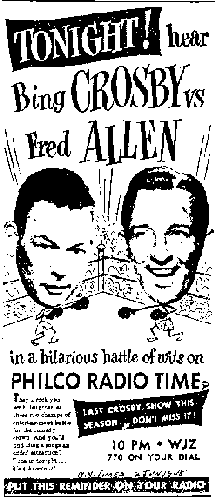With Bing at Work
Preparing Recorded Show is Different
by R. W. Stewart, NY Times, 11 May 1947
 The following article was written about the recording of the June 4, 1947, broadcast of Philco Radio Time starring Bing Crosby and his guests Fred Allen and Connee Boswell.
The following article was written about the recording of the June 4, 1947, broadcast of Philco Radio Time starring Bing Crosby and his guests Fred Allen and Connee Boswell.
With all the jocularity of a clambake getting started in bare feet and shallow water, a crew of performers skylarked through a robust performance borrowing impartially from vaudeville, burlesque and backporch conversation last week before a Radio City audience. Broadcasting was the vehicle. If you could have been there, the guard to the outer door of Studio 6B would have told you in an unnecessary whisper that "Bing Crosby is cutting."
Inside, radio was taking its longest and liveliest joshing since some of its vice presidents began doubling as comedians, with Bing and Fred Allen heavily buttering a script being recorded for delivery June 5.

Mr. Allen
Whether all the gags that came to life without benefit of script ultimately will reach the air on the appointed date is problematical, for, as you probably know, Mr. Crosby's habit now is to record a show from five to twelve minutes over-long and then edit it into a master disk running the allotted time for his audience. Fairly certain of reproduction, however, would be Mr. Allen's insistence that "this had better be a good show." He explained that he might find it disquieting, a month later, "to be in the position of tuning myself out."
Although a number of potential sponsors demonstrated their shyness last fall to Bing's insistence on a recorded broadcast, the performance of his troupe last week indicated that the procedure induces spontaneity and freshness at the microphone. Lacking were the tenseness, split-second timing and the awed hush in the audience as a "live" broadcast prepares to go on the air. For instance, the performance for this recording began at the absurd hour, for radio, of 7:37 p.m. It ended almost forty minutes later.
The recording process apparently stimulates more relaxed performance and freer ad libbing. According to Bing's reasoning, whatever is to be gained thereby can be retained while flat spots are easily eliminated, in addition to which portions of the show can be repeated until the desired delivery is achieved. Yet, perfection isn't always sought. The delight of the audience over a garbled line has been proved too frequently. An amusing "blow-up" stays in.
In "Takes"
Thus, the final recording for broadcast is prepared from a series of "takes." The uninterrupted performance for the studio audience is not entirely the version put on the air. As a matter of fact, a fair portion of the program usually is "canned" during the rehearsal before the studio show.
If it weren't for the microphone, to a casual passer-by Mr. Crosby's show last week might have been going on in one of the theatres that once advertised eight acts for a quarter, a Second Avenue tavern, or a tent. Certainly there was nothing more nonchalant or leisurely in radio.
Connee Boswell and Fred Allen, who shared the guest spot, and Bing bantered generally, more times than not volunteering a line along with each one assigned them in the script. Presumably the only dissident to the proceedings, in view of the audience's reception of them, might have been a conscientious control engineer trying to carry out the show on schedule.
Strikingly unusual was the spendthrift generosity with which commercials were handed out to outfits other than the sponsor. Out-hawking even those relatively impecunious stations which find it necessary to cram as many spot announcements as possible into their broadcasting days, the single performance grandly gave mention to Tums, Alka-Seltzer, Hotel Drake, Harvard University, Toots Shore's, Paramount Pictures, Nino and Nella's, Tenderleaf Tea and the Pittsburgh Pirates. Bing's sponsor is Philco.
Only the rehearsal followed conventional form. Simultaneously, scripts were scanned and lines were mumbled; a suitable tempo for a song was fixed; a telephone bell was kept ringing until it registered properly for the microphone. Except for those parts of the script which were recorded as suitable for the master disk, none of the program took life until the show for the studio audience.
Rehearsal faded into the lull during which the studio audience was seated.
The show and Fred Allen almost immediately picked up the cudgels against certain of radio's upper set. Commenting obliquely on the situation through Bing's easy-going broadcasting ways, he admonished: "You stay relaxed like this and your blood pressure will never get any higher than your Hooper rating!"
If there were principle at all involved in the exhumation of the situation, in view of ABC's sage aloofness to it, it would appear to be whether the now attenuated gag retains enough vigor for one more chuckle. But that may very well be another Hooper story.
As for Mr. Crosby's style of broadcasting, perhaps Mr. Allen summed it up best of all when, as a line fell flat, he flipped: "Okay, folks. We can wait four weeks for the laughs."
The following article was written about the recording of the June 4, 1947, broadcast of Philco Radio Time starring Bing Crosby and his guests Fred Allen and Connee Boswell.
